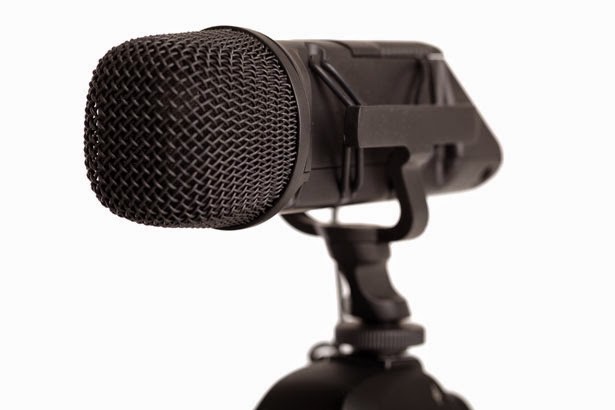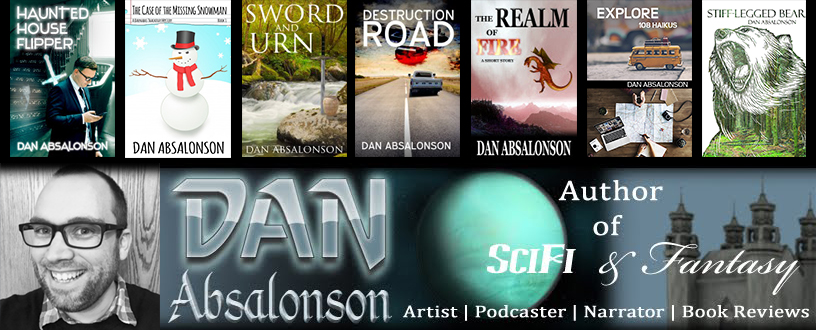 While producing my first audiobook of a full length novel the first thing I realized was that the editing of my raw audio was taking me FOREVER. I had narrated a lot before but they were all short stories. This was an 8+ hour novel and it became very clear that the bulk of my time producing the audiobook would be spent editing. When you're getting paid per finished hour more production time means less money earned for that finished hour of audio. I wish I would have known the things I know now back then. I have since put into practice two different methods when recording narration. You may like one or the other better. Let's get into them and I sincerely hope that these methods will help you shave hours off of your production time. My Digital Audio Workstation of choice is Audacity because it's free, it has everything I need, and I love its user interface. The second method I'll explain goes into detail for Audacity users, but has relevance for other DAWs too. This first method works in any recording software.
While producing my first audiobook of a full length novel the first thing I realized was that the editing of my raw audio was taking me FOREVER. I had narrated a lot before but they were all short stories. This was an 8+ hour novel and it became very clear that the bulk of my time producing the audiobook would be spent editing. When you're getting paid per finished hour more production time means less money earned for that finished hour of audio. I wish I would have known the things I know now back then. I have since put into practice two different methods when recording narration. You may like one or the other better. Let's get into them and I sincerely hope that these methods will help you shave hours off of your production time. My Digital Audio Workstation of choice is Audacity because it's free, it has everything I need, and I love its user interface. The second method I'll explain goes into detail for Audacity users, but has relevance for other DAWs too. This first method works in any recording software.The Clicker
I'll start with the easier of the two methods. For this you'll need a dog training clicker. They cost like 2 bucks and can be found at any pet store. When I write "use the clicker" you could also substitute this with making a loud click with your tongue or snapping your fingers. Every time you make a mistake reading your script stop, use the clicker, then start over on the line. When you finish your recording session you will easily be able to see in the waveform where all of your mistakes are. The loud clicker makes two quick tall spikes in the audio that are easy to spot. This means that instead of listening back through your entire recording to find and delete the mistakes, which takes forever, you can quickly spot them visually and delete them. This takes minutes instead of hours. It will save you a lot of editing time. You might still need to listen through to delete mouth and breath sounds or adjust the timing here and there, but without all the mistakes the recording will me much shorter and this step will take much less time. I love this method and use it all the time. To see what I'm talking about check out this great video from Edge Studios. Skip to 11:05 in the video to see this specific thing, but the whole video is great and don't forget to come back here because the best in this blog post is yet to come!
Punch and Roll
The second method is what many pro audiobook narrators use. It's called the Punch and Roll method. I used it on the last long audiobook project I did and it saved me a lot of editing time. It does make your recording time take longer, but saves hours in the end. If you have software that allows you to do this then it's quite easy. If you use Audacity like I do then it's still possible but requires a bit more work. Punch and roll allows you to stop when you make a mistake, then listen back to the flubbed line and continue recording over the top of it - replacing the mistake on the fly. When you're done recording the timing is all perfect and there are no bad takes that need to be edited out. I haven't found an article anywhere online I can point you to that shows you how to do this in Audacity, a popular free audio editor or DAW, but I'll try and explain it here as briefly as possible. If you use another Digital Audio Workstation like Adobe Audition then Google "punch and roll in Audition" and you'll find how to do it. Here is a method I discovered through some hard thinking and experimenting in Audacity.
Since Audacity doesn't have a punch and roll tool built in you have to get a little creative. Normally you place your playhead a bit before your mistake and then hit record - then the punch and roll tool lets you hear the first part of the line and start recording over the top of it replacing the mistake with your new take. Since we can't do that we're going to use two audio tracks to achieve the same thing, but we'll have to go back afterwards and delete the mistakes, but this will still be much faster and I'll explain why. Okay here we go.
 Hit record. Narrate the script. Oops, you made a mistake. Hey it's cool, even the pros flub lines. Hit stop. Move your play head back to the beginning of the line you made a mistake on. Hit R to start recording on a second audio track. Listen to a few words and then start reading over your mistake. Keep narrating until you make a mistake again. Oops, that didn't sound right. Hit stop. Now move the cursor back to the beginning of the messed up line again, but this time make sure you're back on your original track. This time hit SHIFT+R to append record which means record on the selected track instead of recording onto a new track. The next time you make a mistake, stop, move your playhead back to the start of the line on the track without the mistake, then append record on that other track. When you're done you'll have two audio tracks with the good takes alternating from one track to the other. Now all you have to do is go back and delete the bad takes but now they're easy to find, like with the dog clicker, but even better - all the timing is perfect. If you don't know how to delete audio on a track without everything after it sliding back instead of leaving an empty gap like you want - select the audio you want to delete and hit CTRL+ALT+K to perform a split delete. If you're on a Mac it's Option+Command+K. Now you don't have to listen back through to fix the spaces between lines that are too long or short because everything was recorded with the natural timing instead of having to be fixed after the bad lines were deleted.
Hit record. Narrate the script. Oops, you made a mistake. Hey it's cool, even the pros flub lines. Hit stop. Move your play head back to the beginning of the line you made a mistake on. Hit R to start recording on a second audio track. Listen to a few words and then start reading over your mistake. Keep narrating until you make a mistake again. Oops, that didn't sound right. Hit stop. Now move the cursor back to the beginning of the messed up line again, but this time make sure you're back on your original track. This time hit SHIFT+R to append record which means record on the selected track instead of recording onto a new track. The next time you make a mistake, stop, move your playhead back to the start of the line on the track without the mistake, then append record on that other track. When you're done you'll have two audio tracks with the good takes alternating from one track to the other. Now all you have to do is go back and delete the bad takes but now they're easy to find, like with the dog clicker, but even better - all the timing is perfect. If you don't know how to delete audio on a track without everything after it sliding back instead of leaving an empty gap like you want - select the audio you want to delete and hit CTRL+ALT+K to perform a split delete. If you're on a Mac it's Option+Command+K. Now you don't have to listen back through to fix the spaces between lines that are too long or short because everything was recorded with the natural timing instead of having to be fixed after the bad lines were deleted.There you have it. The first method is a bit less technical and makes for an easier time while recording but still saves you lots of time. It may be the best method for a more dramatic reading of fiction because it's less distracting. The second method saves you the most time but may take a while to get used to. It may work best for non-fiction narration or if you get used to it then use it for fiction as well. If you currently hit record and don't stop until you're session is over with mistakes and all I strongly suggest trying one of these methods. If you do please come back and share your results in the comments. Thanks for stopping by!



Assigned Shift-R to T in settings so it is right next to R - makes it a little more intuitive for me (Edit-Preferences-Keyboard).
ReplyDeleteMike, what a great idea! I wish I would have thought of that before building muscle memory to the default hotkeys :)
DeleteCan't Tell you how much I wish I'd known about this before I finished recording. Trying to finishing editing, but I did each chapter all in one session so I have to listen to all of it. Great tips for the future though. Thank you!
DeleteI'm so glad it's helpful to you, if not now then at least in the future. Thanks for stopping by!
DeleteHappy to help!
Delete